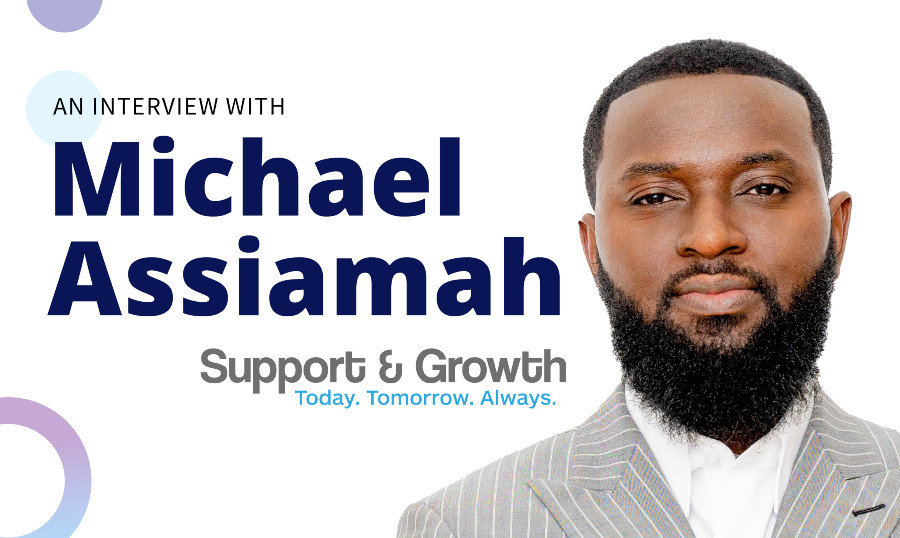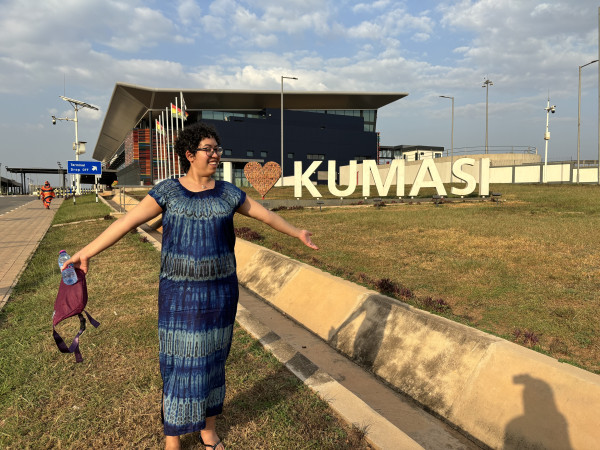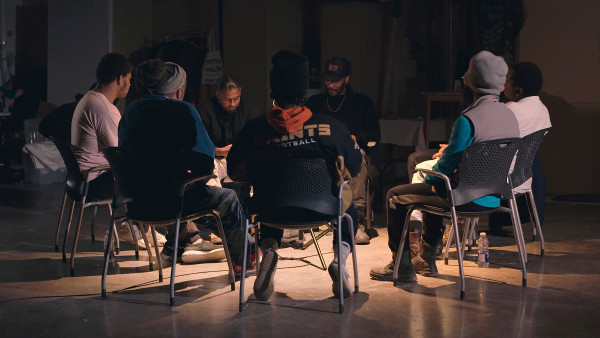Michael Assiamah is the founder and CEO of Support and Growth (S&G), a Black-led organization founded in 2018. Its core purpose is to provide marginalized communities with convenient access to culturally sensitive and quality mental health and wellness services. According to Assiamah, members of racialized groups experience stigma, discrimination, language barriers, and a sense of displacement when trying to access mental health care services. What’s more, addressing those challenges as racialized communities is a challenge.
“The Canadian healthcare system, including the mental healthcare system, has failed Black, racialized, and other minority groups on different levels,” says Assiamah.
Assiamah grew up in a priority neighbourhood in Toronto and witnessed some of his closest friends and other community members struggle with mental health issues.
“We weren't a part of the community and didn't have the right resources to address those issues,” explains Assiamah. “Most of these communities are poorly funded and lack appropriate, culturally relevant, responsive counselling services.”
Assiamah has also had a negative firsthand experience with mental health services.
“I needed access to mental health services after I became a clinical therapist but it took me six months to access these services,” recalls Assiamah. “By the time I got a call, I had already returned to work without any intervention provided.”
Assiamah also explained some of the persistent stereotypes in the community that can influence an individual's ability to seek help for their mental health.
“The system isn't designed to understand Black mental health, so if a Black person admits that they have mental health issues it’s not received well and could have negative consequences for the individual or their family,” says Assiamah. “A very good example is child welfare calls or investigations that may lead to apprehension.”
Assiamah strongly believes that the first step towards providing a solution is to understand the root causes of the problems, which include a shortage of Black mental health professionals and culturally relevant practitioners who are trained to support the needs of racialized community groups.
“Support looks different for everyone,” says Assiamah. “When you are dealing with someone from a different cultural background who doesn’t enjoy the same level of support due to stigma, you need to use unique approaches to support that person.”
Assiamiah wants to reinvent the way Black people access specialized services, although being Black is not the only criterion.
“We’re talking about having more cultural awareness and cultural competence to do the work,” says Assiamah, who hopes his organization Support and Growth (S&G) can help other racialized individuals avoid these struggles.
Support & Growth (S&G)
Assiamah is a registered social worker who specializes in mental health and believes there is no health in the absence of mental health since, without it, a person can’t cope with the day-to-day challenges of life.
His commitment to mental health and his diverse background in social work, child welfare, legal advocacy, and community program development, have helped Assiamah bring his vision to life.
S&G is staffed by a diverse and multidisciplinary team and provides services in more than 10 different languages. They serve individuals of different ages, families, couples, and organizations. S&G also takes a holistic approach towards all aspects of an individual's life when providing support. Things such as food insecurity and shelter are also factored in. All its work has to be tracked and measurable.
“Our services are provided by individuals who are trained in cultural competence and understand how to work with the racialized population,” Assiamah explains.
By working at a systemic level, using evidence-based and culturally responsive approaches, S&G is trying to make mental health services more accessible and affordable for everyone, with a special focus on BIPOC populations.
Services of S&G
Apart from its Mental Health and Wellness Services, S&G also offers an Employee and Family Assistance Program (EFAP), which is a workplace program that can help employees with a variety of problems and challenges before they impact their lives at work or home. The organization also offers a wide range of assessments, including Attention-Deficit/Hyperactivity Disorder (ADHD), and comprehensive psychological assessments.
S&G is also working to increase the accessibility and affordability of mental health services within the community. By bringing together different community service providers they hope to reduce waitlists and provide patients with access to more services.
“We work with community partners who can cover the cost of patients who come to us but cannot afford the service cost,” says Assiamah. “We may also need to refer our patients to things such as legal aid and insurance services when deemed appropriate.”
During the COVID-19 pandemic, S&G has launched online workshops to create safe spaces. They've reached more than 500 people so far. Key topics include anger management, parenting, relationships, career and job loss, and trauma. These workshops are aimed at men, women, youth, and seniors, in partnership with school boards, community health centers, and private businesses.
All S&G workshops are free and patients can gain access to free counselling services. In some cases, fees may be levied depending on the individual's treatment plan and financial conditions.
Currently, S&G works out of Ontario and Quebec and is planning to expand to other Canadian provinces. At the time of writing, S&G is providing most of its services virtually through a secure video platform or phone due to the ongoing pandemic. That makes the service accessible across Canada.
“This has been a poorly invested area but we are beginning to prioritize it and we're going to see more people access these services,” says Assiamah, who sees great importance in having allies, educating the community, and having a strong vision and commitment to the work.“It is a big achievement.”
He stresses the importance of education when it comes to mental healthcare. Studies have shown that that difficulty recognizing the symptoms of depression and other mental illnesses has prevented Black people from seeking mental health services when symptoms first presented themselves. Lack of knowledge and the significant gaps in culturally competent services exacerbate the problem.
Mental Health Tips
Assiamah's tips for improved mental health include:
⦁ Dieting
⦁ Exercising
⦁ Identifying your stressors and triggers
⦁ Maintaining a good work-life balance
⦁ Finding access to family physicians
“Prevention is better than intervention,” Assiamah adds, speaking specifically to Black Canadians. “So use therapy, and for your everyday challenges, there is S&G.” For Black mental health professionals working around the clock to support the community, self-care is also essential.
“We don't need to wait for someone else to do it when we can do it ourselves,” Assiamah asserts. “We have a responsibility to make this change for the next generation so they don't have to go through it, and If we keep pushing, things will change.”
Facts at a Glance
⦁ Black Canadians are more likely to have difficulty finding family physicians, who are often a key gateway to mental health care.
⦁ According to Mental Health Communication of Canada, Black-Caribbean populations, wait times for mental health care is an average of 16 months, while the average time for whites is 7 months.
⦁ Despite the high prevalence of mental illness found in low-income areas (where Black populations disproportionately reside), they often have fewer mental health programs and services.
(Source: Mental Health Communications of Canada)

 By
By 








